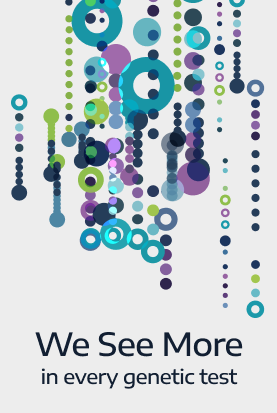News Center

Variantyx Surpasses 2,500 Genomes Analyzed, Highlights the Value of Its WGS-Based Testing Methodology
January 12, 2021
Clinicians at Variantyx, a leader in high complexity hereditary disease testing, recently completed analysis of their 2,500th patient genome. The milestone highlights the growing need for whole genome sequencing (WGS)-based tests in patient genetic diagnostics.
Variantyx’s Genomic Unity® tests pair the patient’s complete DNA sequence with proprietary data analysis algorithms and phenotype-driven filters to uniquely identify and definitively report on all major types of genetic variation within a single assay. Including genome-wide small sequence changes, structural variants, mitochondrial variants and tandem repeat expansions.
Review of the cases identified many examples of positive test results using Variantyx testing after multiple rounds of failed exome and other NGS tests.
- A 26 year old with symptoms of ataxia who had received at least 12 prior genetic tests including chromosomal microarray (CMA), targeted gene testing and exome sequencing and was found to have two pathogenic variants in the POLR3A gene associated with progressive spastic ataxia, including a non-exonic SNV and a >16kb deletion. Both variant types were not identifiable with prior testing because of the limitations of standard next generation sequencing assays.
- A 44 year old with symptoms of dystonia and Parkinsonism who had received at least 4 prior genetic tests including exome sequencing and was found to have two pathogenic repeat expansions in the ATXN8OS gene associated with spinocerebellar ataxia 8.
- A 5 year old with seizures and symptoms of developmental delay who had received prior exome testing and was found to have a de novo, pathogenic 2 exon deletion in the KIAA2022 gene associated with X-linked intellectual disability 98.
- A 17 year old with symptoms of neuropathy who had received at least three prior comprehensive gene panel tests and was found to have two pathogenic variants in the FXN gene associated with Friedreich’s ataxia, including an SNV and a repeat expansion.
- A newborn with symptoms of skeletal dysplasia who had received prenatal NIPT, CMA, and panel testing as well as postnatal CMA and panel testing was found to have two pathogenic splice variants in the SBDS gene associated with Shwachman-Diamond syndrome.
“Providing diagnoses for patients using the most comprehensive testing available is a milestone like no other and puts Variantyx at the leading edge of genomic technology. Not only are we identifying results for patients at the end of long diagnostic odysseys of years and sometimes decades, but we are also seeing the real impact of genomes being a first line test in diagnosing patients early and during a time where treatments may still be effective,” said Christine Stanley, PhD, FACMG, Chief Director of Clinical Genomics at Variantyx. “Our team of MDs, PhDs and Genetic Counselors are honored and humbled to lead the way in using genomes to not only identify single nucleotide variants, but, by using our sophisticated software, to also identify challenging variant types like copy number variants, short tandem repeats, Alu insertions, inversions, single exon deletions and mosaic aneuploidy. By overcoming the limitations of all other platforms used today, we’re providing much needed answers to patients and their families.”
About Variantyx
Variantyx is a CLIA/CAP laboratory providing Genomic Unity®, a whole genome sequencing (WGS)-based testing program for diagnosis of rare inherited and neurological disorders. Its single method approach to comprehensive genetic testing identifies multiple variant types within a single patient sample to provide a unified clinical report. For more information, please visit www.variantyx.com.
